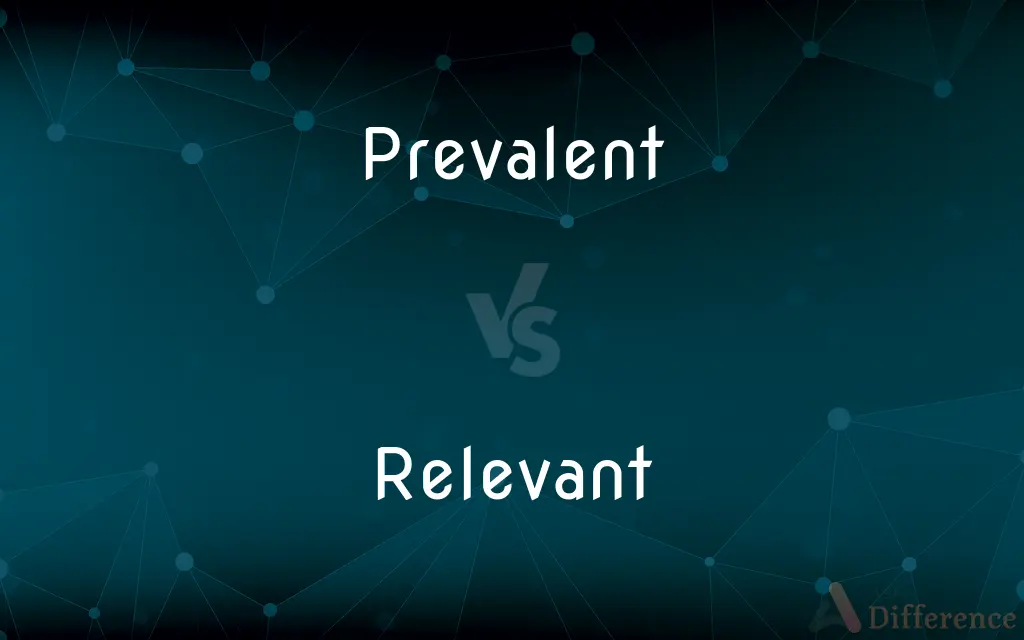Prevalent vs. Relevant — What's the Difference?
By Tayyaba Rehman — Updated on October 27, 2023
"Prevalent" describes something widespread or commonly occurring, while "Relevant" pertains to the matter at hand or is closely connected to a subject.

Difference Between Prevalent and Relevant
Table of Contents
ADVERTISEMENT
Key Differences
Both "Prevalent" and "Relevant" are adjectives that describe the status or pertinence of a topic, though in distinct ways. "Prevalent" denotes something that is widespread or dominant in a particular area or at a specific time.
For instance, a prevalent fashion trend might be observed in numerous cities. On the other hand, "Relevant" refers to something that is closely connected to or suitable for the matter at hand. If a piece of information is relevant, it's directly related to the topic being discussed.
While "Prevalent" is about frequency or dominance, "Relevant" is about significance or appropriateness. An idea can be prevalent without being relevant to a particular conversation, and vice versa.
Lastly, understanding the context is crucial in distinguishing between the two: a prevalent idea in one era might no longer be relevant in another.
Comparison Chart
Meaning
Widespread or common in a particular area/time.
Closely connected or appropriate to the matter at hand.
ADVERTISEMENT
Focus
Frequency or dominance.
Significance or pertinence.
Usage
Often describes trends, diseases, beliefs.
Typically pertains to topics, information, evidence.
Temporal Factor
Can change over time or region.
Depends on the subject or context being discussed.
Synonyms
Common, widespread, pervasive.
Pertinent, applicable, germane.
Compare with Definitions
Prevalent
Dominant or most common.
Green is the prevalent color in this forest.
Relevant
Bearing upon or connected with the matter in hand.
She provided all the relevant details for the project.
Prevalent
Generally or widely accepted.
This belief is prevalent among the community members.
Relevant
Having significant and demonstrable bearing on facts.
His experience is relevant to the job requirements.
Prevalent
Widespread in a particular area at a particular time.
Smartphones became prevalent in the early 21st century.
Relevant
Relating to the subject in an appropriate way.
Make sure your comments are relevant to the topic.
Prevalent
Being in ascendancy or widespread acceptance.
Electric cars are becoming more prevalent on the roads.
Relevant
Closely connected to the matter at hand.
Your point is relevant to our discussion.
Prevalent
Extensively existing or practiced.
Handwritten letters, once prevalent, are now a rarity.
Relevant
Closely connected or appropriate to what is being done or considered
The candidate's experience is relevant to the job
What small companies need is relevant advice
Prevalent
Widely or commonly occurring, existing, accepted, or practiced.
Relevant
Having a bearing on or connection with the matter at hand.
Prevalent
Widespread or preferred.
Relevant
Meaningful or purposeful in current society or culture
Thought that the traditional male role of breadwinner was no longer relevant.
Prevalent
Superior in frequency or dominant.
Relevant
Related, connected, or pertinent to a topic.
Prevalent
(biology) A species that is prevalent in a certain area.
Relevant
(Usually and especially) Directly related, connected, or pertinent, with important ramifications or implications.
His mother provided some relevant background information concerning his medical condition.
Prevalent
Gaining advantage or superiority; having superior force, influence, or efficacy; prevailing; predominant; successful; victorious.
Brennus told the Roman embassadors, that prevalent arms were as good as any title.
Relevant
Not out of date; current.
Prevalent
Most generally received or current; most widely adopted or practiced; also, generally or extensively existing; widespread; prevailing; as, a prevalent observance; prevalent disease.
This was the most received and prevalent opinion.
Relevant
Relieving; lending aid or support.
Prevalent
Encountered generally especially at the present time;
The prevailing opinion was that a trade war could be averted
The most prevalent religion in our area
Speculation concerning the books author was rife
Relevant
Bearing upon, or properly applying to, the case in hand; pertinent; applicable.
Close and relevant arguments have very little hold on the passions.
Relevant
Sufficient to support the cause.
Relevant
Having a bearing on or connection with the subject at issue;
The scientist corresponds with colleagues in order to learn about matters relevant to her own research
Relevant
Having crucial relevance;
Crucial to the case
Relevant testimony
Relevant
Appropriate to the current time, period, or circumstances.
Keeping updated is crucial to stay relevant in this industry.
Common Curiosities
How does "Prevalent" relate to frequency?
"Prevalent" denotes something that occurs frequently or is commonly observed.
When is information considered "Relevant"?
Information is considered relevant when it's closely connected to or suitable for the matter being discussed.
Can something be "Relevant" but not "Prevalent"?
Yes, a topic can be relevant (pertinent to the discussion) without being prevalent (widespread).
Can a once prevalent idea become irrelevant over time?
Yes, what's prevalent in one era might lose its relevance in another due to societal changes.
Is "Relevant" the same as "related"?
While both terms indicate a connection, "Relevant" emphasizes a stronger, more pertinent connection to the subject.
What's the opposite of "Prevalent"?
The opposite of "Prevalent" might be "rare" or "uncommon."
Why is understanding what's prevalent important in marketing?
Recognizing prevalent trends helps marketers tailor their strategies to what's popular or in-demand.
What does "Prevalent" mean in terms of trends?
"Prevalent" describes trends that are widespread or dominant at a particular time.
How do I use "Prevalent" in a sentence?
"The use of solar energy is becoming more prevalent in urban areas."
Can something be both prevalent and relevant?
Yes, something can be both widespread (prevalent) and pertinent to a topic (relevant).
Is "Relevant" subjective?
To some extent, yes. What's relevant to one person or context might not be to another.
Can a fact be irrelevant?
Yes, if a fact doesn't pertain to the topic at hand, it can be considered irrelevant.
Does what's prevalent always reflect the majority's view?
Typically, yes. "Prevalent" often denotes what's common or accepted by the majority.
How can I determine if a piece of information is relevant?
Consider if the information has a direct bearing or connection to the subject being discussed.
Can what's "Relevant" change based on context?
Absolutely. The relevance of information often depends on the context or subject being discussed.
Share Your Discovery

Previous Comparison
Car vs. Bicycle
Next Comparison
Warlock vs. WizardAuthor Spotlight
Written by
Tayyaba RehmanTayyaba Rehman is a distinguished writer, currently serving as a primary contributor to askdifference.com. As a researcher in semantics and etymology, Tayyaba's passion for the complexity of languages and their distinctions has found a perfect home on the platform. Tayyaba delves into the intricacies of language, distinguishing between commonly confused words and phrases, thereby providing clarity for readers worldwide.














































